
Guests
- Charles KernaghanExecutive Director of the National Labor Committee.
With Christmas just over a month away, a new report by the National Labor Committee accuses US-based Christian retailers and churches of selling crucifixes made under sweatshop conditions in China. We speak with NLC executive director Charles Kernaghan. [includes rush transcript]
Transcript
AMY GOODMAN: With the holidays just a month away, a new report by the National Labor Committee accuses US-based Christian retailers and churches of selling crucifixes made under sweatshop conditions in China. The labor rights watchdog announced Tuesday the crucifixes were made by young women working fourteen- to twenty-five-hour shifts for less than half of China’s legal minimum wage. The report implicates the New York City-based St. Patrick’s Cathedral, as well as Trinity Church, and at the national level, the $4.63 billion Association for Christian Retail.
The Association rejected the claims in the report, called them, quote, “irresponsible and unfounded,” noting the report lacks specific evidence and said their retailers had recently found cleaner factories, improved living conditions, and increased wages at crucifix production centers in China. St. Patrick’s Cathedral and Trinity Church have both reportedly pulled the crucifixes from their store shelves.
We’re joined right now by Charlie Kernaghan. He is the head of the National Labor Committee.
Talk about what you found.
CHARLES KERNAGHAN: Well, crucifixes like this, which were sold at St. Patrick’s and at Trinity Church, were made in a factory in Dongguan, China, by young women, some of them as young as fifteen, sixteen years of age. And they work routinely from 8:00 in the morning until 11:30 at night, fifteen-and-a-half hours a day, seven days a week. They’re at the factory 108-and-a-half hours a week. They were paid twenty-six-and-a-half cents an hour.
AMY GOODMAN: How did you trace this?
CHARLES KERNAGHAN: Well, actually, the workers smuggled production orders out of the factory. So this is the very production order for this crucifix, and we can trace it back through the serial numbers. So, there’s no doubt that this was made in this factory in the Junxingye factory in China and then went to Trinity Church and went to St. Patrick’s. The workers actually took a take-home wage of only nine cents an hour, because they deducted money for their dorm and food, which was absolutely horrible, horrific conditions. This was an unbelievable sweatshop, with no rights whatsoever. So crucifixes have been reduced to another cheap sweatshop commodity. And we think —
AMY GOODMAN: Did you go to this sweatshop?
CHARLES KERNAGHAN: No, we’ve been to China many times. But it just doesn’t work. You know, you’re always followed. Anyone seen in contact with us would have a fast ticket to prison. So we have to keep as far away as possible.
AMY GOODMAN: Now, what about the Christian retailers? While Trinity Church and St. Patrick’s, after your news conference yesterday, standing in front of St. Patrick’s, have pulled this cross from the shelves, the retailers’ association has not been so conciliatory. Your response?
CHARLES KERNAGHAN: Well, you know, they say this association has 2,055 member stores in the United States and suppliers, and they say their mission is to spread the word of God and that they’re going to transform people’s lives through Christ, through God, through these Christian products that they sell. And it turns out that they’ve all followed Wal-Mart to China en masse, and they’re there to exploit workers who have absolutely no rights, pay them pennies an hour to make their religious items. The markups are extraordinary. I mean, they’re like Nike. They’re bringing in Bible bags, for example, that cost $1.40 to make in China, and they’re selling them for $17.99. That’s a 1,185 percent markup. So, I would say now most of the religious items, crucifixes and others items, they’ve gone to China 100 percent completely. And what’s sad about it, of course, is that the workers in China have no right — you know, no freedom of religion, no human rights, no worker rights, no freedom of association. So now the religious — these religious retail stores are actually on the bandwagon just to exploit the workers for everything they’re worth. And, you know…
AMY GOODMAN: They say your report is “irresponsible and unfounded,” saying it lacks specific evidence and that the retailers have recently found cleaner factories.
CHARLES KERNAGHAN: Well, you know, this is how pathetic it is. The company that actually purchased — that made this order, this is the Singer Company. It went through a company called Full Start, which is a big company in China but has an office in Rhode Island. And so, the Singer Company said to them, “When you make our crucifixes, will you use sweatshop labor?” And the Chinese company said, “No, we will not.” So it’s like asking Jack the Ripper, you know, “Do you respect young women?” And that’s the amount of their concern over human rights. It’s actually laughable. And I would say, if this Christian Retail Association has one iota of integrity, they should immediately release the names and addresses of every factory they use in China to make their religious items, which they won’t do, because they know there’s one horror show after another.
AMY GOODMAN: And your response to both St. Patrick’s Cathedral in New York and Trinity Church, a historic church in New York, both pulling the crucifixes from their store shelves?
CHARLES KERNAGHAN: Well, I mean, it’s a good first step. I mean, they shouldn’t be selling crucifixes that were made by young women who are abused. But it can’t end there. They have a responsibility to those young workers in China. They were exploited. They were cheated of their wages. They were housed under miserable conditions, stripped of every single right. St. Patrick’s Cathedral and Trinity Church must make those workers whole again. That factory, they should clean that factory up. They should guarantee — they should take steps to guarantee that the rights of the workers are finally respected. And this is just like the tip of the iceberg. I mean, in other words, we would have to say after this — we were shocked. I thought crucifixes were made by nuns in the United States. I had no idea that they were made in China. We only knew about it when the workers sent us pictures of the crucifixes, and we couldn’t believe it.
AMY GOODMAN: Do they say “Made in China”?
CHARLES KERNAGHAN: No, that was the other thing. This particular company lied and said they were made in Italy. So there was no origin. In fact, none of these crucifixes have “Made in China” on them.
AMY GOODMAN: That’s interesting. We called St. Patrick’s; they didn’t respond. We called Trinity Church. They did say they had pulled it from the shelves, but thought that their crosses were made in Italy.
CHARLES KERNAGHAN: Yeah, yeah. No, they’re made in China. And they have to be labeled; they’re just not. So the US Customs Department has to have a discussion with the Singer Company and with the Christian Retail Association, because they obviously left China off of the box and left it off of their crucifix for a reason. This is the very crucifix. You can see the serial number. The exact same serial number is on the production order.
AMY GOODMAN: What is the Singer Company?
CHARLES KERNAGHAN: Well, it’s one of these Christian retail companies, has $10 million in sales. It’s not particularly small. But when you go to their website, they display sixty-six different types of crosses, but they sound like Crazy Eddie or Wal-Mart saying, “Go to our website. Look at our crucifixes and our wall crosses. You will love our selection. And you will love our prices. We will never be undersold.” I mean, it was like, crucifixes now are being trafficked like, you know, low-cost things in Wal-Mart. So, it’s something. It’s like the bottom has fallen out.
AMY GOODMAN: Speaking of Wal-Mart, we’re about to play excerpts of a film called What Would Jesus Buy?, and you’re actually featured in this, Charlie. But I wanted to ask you a question about a wholly different issue. It’s a piece that just came out in the Wall Street Journal. This was the St. Louis Post-Dispatch saying that Debbie Shank, a Wal-Mart employee, was gravely injured in a 2001 car accident after colliding with a truck. The accident left her brain-damaged, confined to a nursing home. The driver of the truck was found at fault. Shank’s Wal-Mart health insurance paid the bills from the accident. The court judgment allowed her family to continue with her massive medical bills. But now Wal-Mart is suing Shank to get that judgment paid back to them, entering federal court, demanding the civil suit judgment and legal fees be paid back to the company — almost $500,000. So this woman who got health insurance from Wal-Mart was in a terrible accident, in a nursing home, her family having to pay her massive bills. Now Wal-Mart wants the health insurance money back, because she won a settlement with the driver at fault.
CHARLES KERNAGHAN: Yeah.
AMY GOODMAN: Is this typical?
CHARLES KERNAGHAN: That’s Wal-Mart, yes. Yeah, I mean, they’ll squeeze a dime, they’ll squeeze a nickel until the buffalo screams. I mean, it’s — this is a company that — it knows nothing else but to grab, grab, grab. In fact, they were taking out life insurance policies on their own workers, so that when they — then they would take a life insurance policy out on their workers, and then they would go through Social Security numbers to see who died, and then they would collect their life insurance. And they’d give the worker like a pittance, like a couple hundred dollars. So they’re making money off their own workers who are dying.
AMY GOODMAN: Well, I want to thank you very much for joining us. We will link to your report. Charlie Kernaghan is the head of the National Labor Committee.

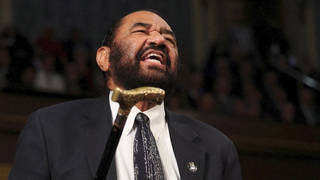
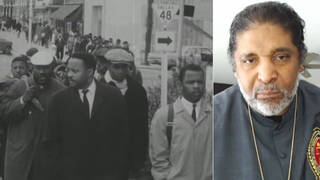
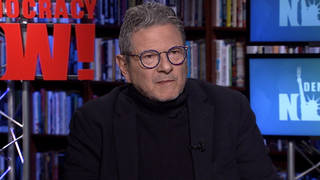
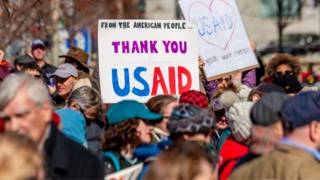





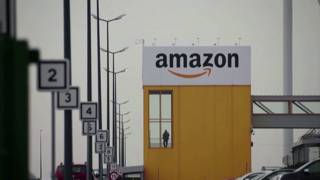
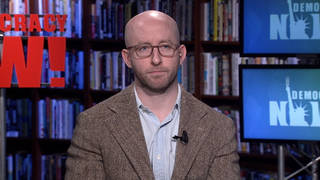
Media Options